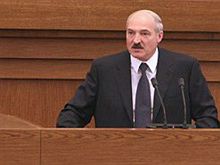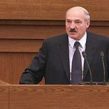
Lukashenka Lashes Out at Opposition
Publication: Eurasia Daily Monitor Volume: 6 Issue: 57
By:

As negotiations continue between the EU and Belarus with the prospect of the latter joining the Eastern Partnership, the Belarusian opposition has formulated its own conditions for any future agreement. In turn, President Alyaksandr Lukashenka has branded his opponents a "fifth column" and seeks to exclude them from all aspects of the discussions. His attitude reflects the limitations imposed on attempts to draw Belarus closer to the EU with a concomitant liberalization or democratization of his regime.
Several sectors of the opposition have been active in recent weeks. The Presidium of the Political Council of the United Democratic Forces (UDF) met on February 25 and adopted a decision to support Belarus’ participation in the Eastern Partnership but only on condition that the Belarusian authorities fulfil all the requirements outlined a year earlier when the UDF sent a delegation to Brussels. In the view of the leaders of the UDF, it is imperative that Belarus "returns" to Europe, but its current laws must be reformed, a zone of free trade introduced, and a normal business environment introduced. The negotiations, the UDF stressed, are about the futures of ten million people, and not simply about the authorities (Belorusy i Rynok, March 2-8).
According to Lyavon Barcheuski, leader of the Belarusian Popular Front, the possibility that on May 7 Lukashenka travels to Prague for the negotiations should depend on significant steps being taken toward democratization. Alyaksandr Kazulin criticized the fact that the recent visit to Minsk of Javier Solana, EU High Representative for Common Foreign and Security Policy (EDM, March 3), took place behind closed doors and asked whether the policies of the EU toward Belarus are to be based on pragmatic or moral principles.
Kazulin, the last of the designated political prisoners to be released in 2008, received an official pardon, but his conviction was never cancelled (www.charter97.org, September 9, 2008). In early March both he and Anatol Lyabedzka, leader of the United Civic Party, spent three days in Strasbourg taking part in discussions of the European Parliament about the Eastern Partnership. Moreover, they talked about the human rights situation in their country with Benita Ferrero-Waldner, External Relations Commissioner of the EU. On March 13, they visited Vilnius and spoke to Andrei Kubilius, Prime Minister of Lithuania, and Foreign Minister Vygaudas Usackas. While not opposing the extension of the suspension of sanctions (for a further nine months), they insisted that changes in Belarus had to be more than token ones (Belapan, March 18).
In mid-March, the UDF also formed its own program for overcoming the effects of the world recession on Belarus in a lengthy document authored, inter alia, by Stanislau Bahdankevich, former chairman of the National Bank of Belarus, and Leanid Zaika, one of the country’s most respected economists. According to the chairman of the Party of Communists, Syarhey Kalyakin, the key task is to open up the economy and put an end to "bureaucratic intervention" by the state (Belapan, March 16). The document is particularly sensitive because the authorities have yet to acknowledge that the recession has had a significant impact on the country. Kalyakin has delayed an Extraordinary Congress of his party from mid-March until May 23-24 in order for it to devise its own program to deal with economic issues (Belorusy i Rynok, March 9-15).
On March 17, while visiting a timber factory in Vitsebsk region, Lukashenka responded to the initiatives of the opposition in a diatribe resembling some of his speeches of the late 1990s. In his opinion, the suggestions offered by the opposition would inflict untold harm on the state. They seek to privatize land, he added, but "Who today wants to take this land?" No one should believe the opposition leaders when they support the lifting of economic sanctions or ending Schengen visas, he declared; the opposition is simply hysterical because the discussions between the government and the EU are going ahead (Narodnaya Volya, March 17).
The most heated moments of his speech were the following: "This is not an opposition, it is a fifth column; these are the enemies of the Belarusian people." He added that he had a lot of information he was prepared to divulge about the UDF leaders that would shock circles in Brussels, Strasbourg, other European capitals, and the United States. Some "great figures" (the sarcasm is evident) that the authorities released from prison and pardoned are now yelling that the government needs to be supervised, cajoled, and given "homework" before any agreement can be reached with Europe (Narodnaya Volya, March 17). There is little doubt that the peregrinations of Messieurs Kazulin and Lyabedzka induced such hyperbole.
More to the point, however, it demonstrated that the government is unprepared for and unwilling to participate in any dialogue with the opposition. To brand the UDF’s leaders as "enemies of the people" not only tries to exclude them from the discussions, it indicates that in the president’s mind they are criminals. The phrase itself has echoes of Stalinism and indicates a deeply inherent fear within the Belarusian leadership that it might lose control over the Eastern Partnership process. Such anxiety is not entirely illogical given that the UDF leaders have been frequent visitors in the capitals of Europe, conducting discussions, seminars, and talks with a wide variety of European statespersons, politicians, and economists. But the reaction of the president is hardly a good omen for any steps toward democratization.




